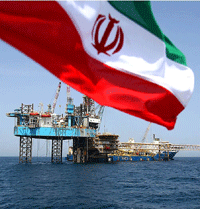
Sanctions may hit UAE's Iran condensate imports
Dubai, June 30, 2012
Dubai's national oil company may have to stop importing condensate from Iran unless Washington grants it an exemption or temporary exception from this week's tightening of US sanctions, diplomatic and industry sources said.
US State Department officials said that financial transactions that facilitate the import of Iranian condensate are liable to a new round of measures effective June 28 that aim to cut Iran's oil revenues and force Tehran to drop its disputed nuclear programme.
The fresh sanctions target condensate, produced in association with gas, which is Tehran's second-biggest source of export revenue after crude and refined products, which were targeted in earlier sanctions.
Officials at Dubai-government-owned Emirates National Oil Compay (Enoc) declined to comment.
But two Gulf-based sources close to the company said Enoc had already applied for an exception. The US State Department declined to confirm or deny this.
'I am sure they are petitioning for a temporary exemption, and this could apply for six months if not a bit longer. Thereafter, they need to find an alternative,' one industry source said.
'As a major US ally and a big part of the strategy against Iran, I would have thought the UAE would get some leeway,' another Dubai industry source.
Opec member the UAE is home to one of the biggest Iranian communities in the world and has a thriving trade across the Gulf with Iran.
Dubai uses Iranian condensate at Enoc's 120,000 barrels per day (bpd) Jebel Ali refinery that services its domestic fuel market.
'Almost everything they put in that refinery is Iranian condensate. They would either have to shut down if they stop or find an alternative,' a Dubai industry source said.
Dubai accounts for at least half of Iran's condensate exports, which averaged 220,000 barrels per day in the first four months of the year, shipping data shows.
Most of the condensate comes from Iran's South Pars gas field in the Gulf. Its other buyers include China, Japan and Singapore.
The UAE might find it problematic to obtain a reprieve for condensate imports, because 180-day exceptions are granted on the basis of a significant reduction in crude oil imports, not condensate.
But what is even more complicated in Enoc's case is the fact that it has a barter deal with Iran for the condensate, according to industry sources, while sanctions are designed to target financial transactions and financial institutions.
How US officials might respond in the case of barter remains unclear. Enoc will have to seek alternatives to Iranian condensate sooner or later, traders and sources say.
According to traders, any replacement would come from suppliers such as Qatar or Abu Dhabi and could be much more expensive than Enoc's current deal and may not include the comfortable credit terms that Iran grants to the Dubai-based company.
Decades of heavy subsidies on fuel prices, which oblige Enoc to sell its fuel at a fraction of what its costs, have swollen its debt and added to Dubai's financial problems.
The subsidies are unlikely to be phased out in any time soon. The UAE Federal National Council last month asked for a reduction in fuel prices.
'If Enoc's condensate acquisition costs were to increase by $1 per barrel as a result of sanctions, for eg., this would cost them $44 million per year. That's not really significant compared to the $1.5 billion they have lost on subsidised gasoline sales in recent years,' Robin Mills, head of consultancy at Dubai-based energy consultancy Manaar.
'Perhaps more significant, given Enoc's significant debt load, is that the Iranians were probably giving them easy credit terms on purchases, as with Greece,' he said.-Reuters







